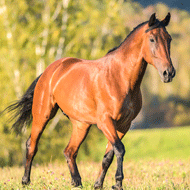Temperature ranges to monitor horse health ‘may be inaccurate’

The aim is to repeat the study on a number of other equine yards across the UK to review the overall normal range.
Temperature ranges that are traditionally used to monitor horse health may be inaccurate, new research suggests.
Rectal temperature is vital for monitoring equine wellness and allows for early detection of infections and assessment of disorders including colic.
Whilst books and other sources have provided ‘normal’ temperature ranges for many years, there has been no recent published work to determine whether these values are representative of healthy horses.
Researchers from Nottingham Trent University (NTU), working with the Royal Agricultural University, investigated the normal body temperature of 41 horses on the NTU yard, using more than 600 measurements.
Findings show that the upper limit of the ‘normal’ range published previously (38.5ºC), is typically 0.5ºC higher than the results from clinically normal horses in this study. Researchers found the normal temperature range for horses on this yard to be 36-38ºC.
The study, which has been published in the Journal of Equine Veterinary Science, suggests that the temperature ranges cited in textbooks may need reviewing and updating. The aim is to repeat the study on a number of other equine yards across the UK to review the overall normal range.
Lead author and veterinary surgeon Emily Hall said: "Due to factors such as antibiotic resistance, climate change, and ever-increasing movement of horses, it is increasingly important that early signs of ill-health or disease are picked up as early as possible.
“By establishing a reference range specific to the yard at NTU, we can now be more confident in identifying horses that are too hot, or too cold, and take appropriate action.”



 A free webinar exploring the development of the Kennel Club's registration system and the evolution of closed breed registers has been announced.
A free webinar exploring the development of the Kennel Club's registration system and the evolution of closed breed registers has been announced.